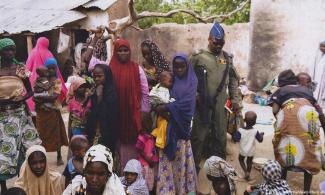
The accounts of the two women, who said they met by chance at a wedding outside Nigeria, buttress the testimony of more than 30 other women and girls who said they endured forced abortions during the government’s nearly 14-year war against Islamist insurgents.
As National Human Rights Commission, NHRC, holds hearings on reports of a mass army-run forced abortion programme in Nigeria’s war-torn northeast, two more women have said that they underwent abortions in military custody without their consent.
The accounts of the two women, who said they met by chance at a wedding outside Nigeria, buttress the testimony of more than 30 other women and girls who said they endured forced abortions during the government’s nearly 14-year war against Islamist insurgents.
Their stories also align with accounts of soldiers and health workers involved in the clandestine army scheme, according to Reuters.
Reuters revealed in December 2022 that at least 10,000 pregnancies had been terminated among women and girls impregnated by Islamist insurgents since 2013.
According to the report, Binta Yau and Rabi Ali, the two women who spoke recently said they met about a year ago and soon discovered they had a painful experience in common: Both had been captured and impregnated by Islamist insurgents. And both lost their pregnancies after they were taken into custody by Nigerian soldiers and given unidentified pills and injections.
“I began to feel like we were sisters,” said Yau, who, like Ali, said she is about 30.
She said she wants their stories to be told.
“If the world hears what happened to us, and there is a possibility of human rights or other organisations stopping the bad things that the Nigerian military did to us, maybe it won’t happen again in the future.”
The women’s accounts are strikingly similar to those of the 33 Nigerian women and girls Reuters interviewed in the December report. Many of the abortions were done without the women’s consent or even their knowledge at the time.
Some were as young as 12 years old. Some women and girls were tied down, drugged into submission or made to undergo the procedures at gunpoint, Reuters’ investigation revealed.
The report also drew on military and hospital documents, as well as interviews with five civilian health workers and nine soldiers and other security officials who participated in the programme. Most of the witnesses spoke to Reuters on condition of anonymity, citing fear of retribution from the military. But Yau and Ali, who now live outside Nigeria, agreed to be named, as did two other women in the December story who had left the country.
The accounts of Yau and Ali are coming to light as a panel of the government-appointed National Human Rights Commission, NHRC investigates a series of stories by Reuters that exposed the abortion programme and a pattern in the military of targeting and killing children, from infants to teens, in combat operations.
Among the rationales cited by soldiers who participated in these operations was the belief that children in the region were related to, or working with, Islamist insurgents. The abortion programme was driven, in part, by a notion within the military that children of insurgents were destined to one day take up arms against the Nigerian government.
Brigadier General Tukur Gusau, a spokesman for defence headquarters, declined to comment and directed all inquiries to the NHRC panel, citing the ongoing investigation. The NHRC did not respond to requests for comment.
Nigerian military leaders previously have adamantly denied the existence of the abortion programme and the deliberate killing of unarmed children.
“Not in Nigeria, not in Nigeria,” said Major General Christopher Musa, then the top commander of the counterinsurgency campaign in northeast Nigeria, in a November interview with Reuters that addressed the abortion programme.
“We respect families. We respect women and children. We respect every living soul.”
Lai Mohammed, the information and culture minister, also denied the report last December.
“The Federal Government hereby categorically states that there is no ‘secret, systematic and illegal abortion programme’ being run by our military in the northeast or anywhere across the country,” Mohammed said at a public event in Abuja.
“We also hereby reject the accusation of running an abortion programme levelled at our military,” he added.
Asked about the military’s comments on the programme, Yau replied: “This happened to me, and they are denying it. Honestly, I feel like they have some wickedness in their hearts, to be denying what they’ve done to us.”
Ali, who was interviewed separately, responded similarly. “I know the Nigerian military did these things, because it happened to me. I am sure that I lost my baby because of the abortion they gave me, and the treatment they gave me. Also to my friend Binta.”
Yau said her abortion was done about three years ago at Giwa Barracks, a detention centre in Maiduguri, the largest city in Nigeria’s northeast and the command centre of the government’s war on Islamist extremists.
Three other women were forced to have abortions in the same room with her, Yau said.
Yau’s account is consistent with those of other women and health workers who told Reuters abortions were done in groups, from a handful to 50 or 60 at a time. Four of the almost three dozen women interviewed by Reuters said their abortions took place at Giwa Barracks.